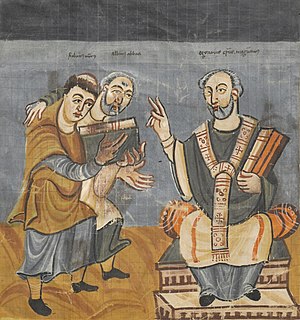Calendar year
Calendar year
Rabanus Maurus (left), with Alcuin (middle), presents his work to archbishop Odgar (right)Year 782 (DCCLXXXII common year starting on Tuesday (link will display the full calendar) of the Julian calendar , the 782nd year of the Common Era (CE) and Anno Domini (AD) designations, the 782nd year of the 1st millennium , the 82nd year of the 8th century , and the 3rd year of the 780s decade. The denomination 782 for this year has been used since the early medieval period, when the Anno Domini calendar era became the prevalent method in Europe for naming years.
Events
By place
Abbasid Empire
Arab–Byzantine War : Arab forces (95,000 men) under Harun al-Rashid , son of the Abbasid caliph Al-Mahdi , cross the Taurus Mountains and capture the Byzantine border fortress of Magida . Harun leaves his lieutenant Al-Rabi' ibn Yunus to besiege the city of Nakoleia (Phrygia ), while another force (30,000 men), probably under Yahya ibn Khalid , is sent to raid the western coastlands of Asia Minor . Harun himself, with the main army, advances to the Opsician Theme .Summer – Harun al-Rashid reaches as far as Chrysopolis , across the Bosporus Straits from the Byzantine capital, Constantinople . After the defection of the Armenian general Tatzates , Empress Irene accepts a three-year truce , including the annual payment of a tribute of 70,000 or 90,000 gold dinars , and the handing over of 10,000 silk garments. Harun releases all his captives (5,600 men), including chief minister Staurakios and other hostages .[ 1]
Byzantine Empire
Europe
Summer – Saxon Wars : King Charlemagne sends a punitive expedition (an elite force of Eastern Frankish troops) under the command of Adalgis the Chamberlain , Gallo, and Worad, supported by Saxon forces, to deal with the Saxons and Sorb raiders in Thuringia .
Battle of Süntel : The Franks under Charlemagne are defeated by Saxon rebels, led by Widukind . He succeeds in wiping out more than half of the occupying Frankish forces and again raises the banner of revolt.Autumn – Charlemagne returns from his campaign in Italy , and musters a Frankish army of available troops in Bavaria . He then marches to Saxony , probably to Eresburg . Charlemagne marches north, down the Weser to the Aller River , making camp near Verden .
Massacre of Verden : Charlemagne executes 4,500 rebel Saxons at Verden for practicing paganism . He issues the Capitulatio de partibus Saxoniae Christianity on the Saxons, making Saxony a Frankish province.Charlemagne summons Alcuin , Anglo-Saxon missionary , to Aachen , and appoints him as chief adviser on religious and educational matters. He becomes the leading scholar and teacher at the Carolingian court .
By topic
Religion
Births
Deaths
References
^ Garland 1999 , pp. 76–77.^ Runciman, Steven. "The Empress Irene the Athenian." Medieval Woman. Ed. Derek Baker. Oxford: Ecclesiastical History Society, 1978.
Sources
